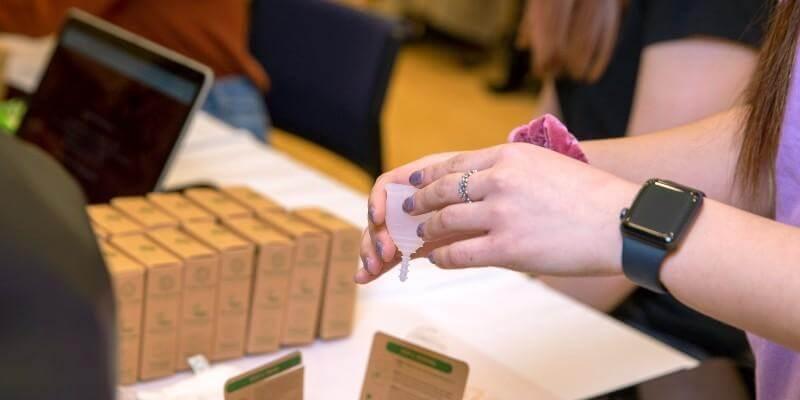Through an initiative led by UVM Eco-Reps in the Office of Sustainability and supported by LivingWell, many students are now using recyclable menstrual cups in place of expensive and wasteful tampons and pads. The product, called the OrganiCup, was offered free to UVM students who registered during a sign-up period earlier this month.
When the CampusCup campaign launched, Caylin McCamp of the Office of Sustainability hoped to distribute 600 cups. By the end of the campaign, 1,363 students had signed up.
“It’s exciting to offer this product for free to students because they are usually $28 each and that upfront cost can prevent people from trying it out even though it saves money in the long term,” says McCamp.
The product is made of soft medical-grade silicone that lasts 5-10 years and OrganiCup estimates one cup displaces 264 pads or tampons each year.
Why not reuse?
The environmental, financial and health advantages of using a menstrual cup seem too numerous to ignore.
Plastic tampon applicators and plastic strips on the back of sanitary pads are often made from thermoplastics which require large amounts of fossil fuel to manufacture. Then, the discarded products end up in the waste stream. The Campaign for Safe Cosmetics estimates that in North America nearly 20 billion pads and tampons are sent to landfills every year.
At UVM alone over 55,000 are provided for free in restrooms across campus. The Office of Sustainability will be working with UVM custodial services to see if this number decreases after the menstrual cups have been distributed.
Ali Drew ‘22, an environmental studies major who works as a manager for the Eco-Rep program, notes in a recent Vermont Cynic letter to the editor that the cost of menstrual products is not trivial, especially for students on a tight budget.
“Across the country students of all ages aren’t able to afford supplies they need for their period,” she writes. “This is called period poverty. A national study of college students published in January showed 10% experience period poverty every month, with higher impacts on BIPOC students.”
She notes that necessary menstrual products are a monthly necessity and the lifetime cost of tampons alone can reach into the thousands of dollars for one person.
Fighting Menstruation Stigma
According to McCamp, LivingWell helped get the word out and also trained Eco-Reps on all things periods (from culture to anatomy) so that Eco-Reps could take a holistic and inclusive approach to the campaign instead of just advertising menstrual cups as a zero waste product.
Drew was especially interested in the phenomenon of “period shame” and how people with periods are pressured to deal with their menstrual cycles privately and discreetly.
She believes the tabling Eco-Reps conducted this month in each residence hall learning community helped bring the conversation out in the open.
“Just by walking by a table where menstruation is the main topic I think brought attention to the issue. Lots of people came by to learn about the cup and share their own personal experience.”
A big takeaway for Drew is that menstruation is a human issue.
“It’s inclusive of people of all gender identities,” she said. “Transgender people have periods; non-binary people have periods. It’s not just a women’s issue.”
